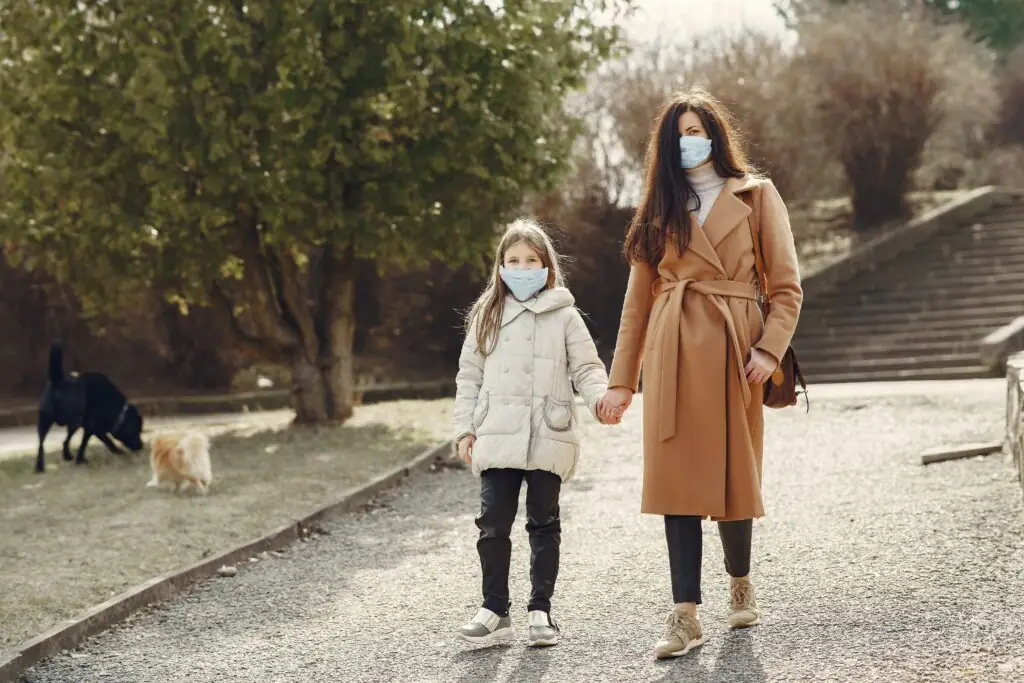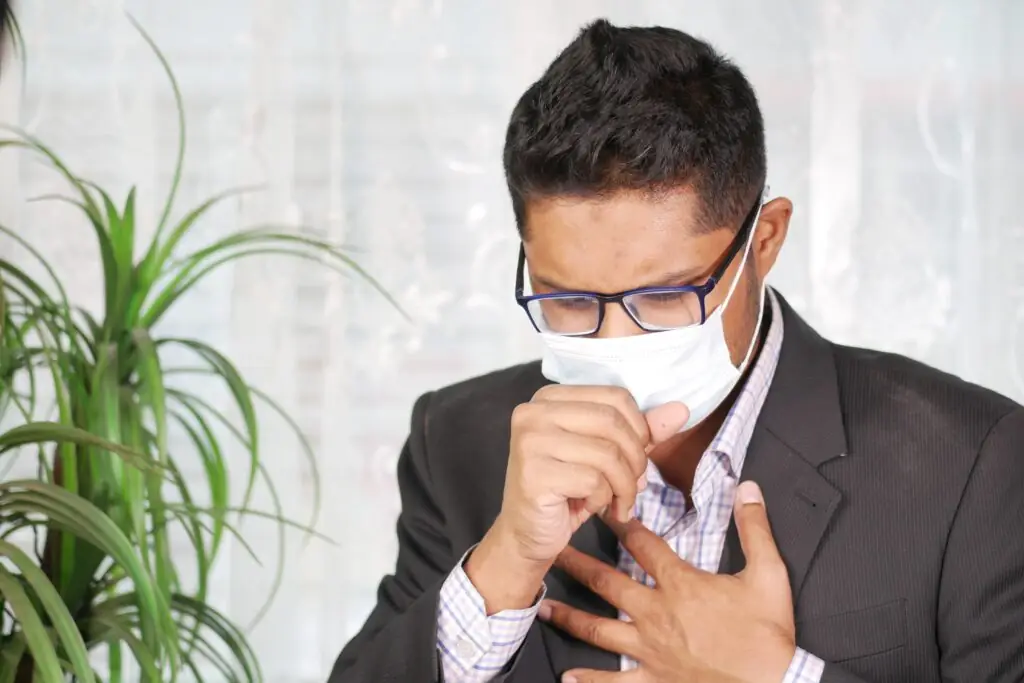How Can an Allergy Cause a Cough: A Detailed Review

A runny nose and sneezing are well-known symptoms of allergies. Can an allergy cause a cough? Why does it happen? How do you tell an allergy cough from one that is caused by an infection? What medications can you try?
Read on, and you will find the answers to all these and numerous other questions.
Does an Allergy Cause a Cough?
An allergy cough is not at all uncommon, and the reasons why you may have it are very simple.
An allergic reaction happens when your immune system is exposed to some substance (that can be totally harmless) and responds to it in too strong a way (as if it poses a real danger). When your body gets in contact with an allergen, immunoglobulins E (IgE) are produced that, in their turn, lead to histamine being released into the bloodstream. Histamine causes very small blood vessels to dilate; fluid from them leaks into the nearby tissues. When minuscule blood vessels in your nose widen, you end up having a runny nose and nasal congestion.

Small quantities of excessive mucus from your nose get into the back of the throat. This leads to an irritation that you feel as an itchy or tickling sensation. It is this irritation in the throat that makes you cough.
So, if you suffer from an allergy cough, you are also very likely to have other symptoms of the allergic reaction like:
- a runny and/or congested nose
- frequent sneezing
- itchy throat
- fatigue and headache.
It also needs to be said that there is another mechanism for having a cough as a result of the allergic reaction. Second-generation antihistamines (medications that don’t let histamine attach to the cells) have a well-known side effect of making your throat dry so that it gets scratchy and you end up coughing. If your doctor prescribed you medications that contain loratadine (available under trade names Claratyne, Claritin, Clarityn, and others) or cetirizine (Incidal, Zyrtec, and others), they will alleviate all your other symptoms but you might still experience coughing.
Allergy vs. Infectious Coughing
Coughs that happen because of an allergic reaction are usually dry, while coughs that are caused by respiratory infections are likely to be productive or wet (you cough up mucus). What’s more, if you suffer from flu or other viral infections, you might have such symptoms as a loss of smell or taste, chill, fever, vomiting, diarrhea, and muscle aches.

There are also other conditions that very often lead to chronic coughs:
- Smoking (there is really not a system in the body that is not negatively affected by smoking)
- GERD (gastroesophageal reflux, a condition when stomach content regularly gets into the esophagus and irritates it)
- Chronic bronchitis
- Asthma
To determine the true causes of your coughing (especially if it is severe and persistent), you might have to see a doctor and have special tests.
There are two main types of tests used to determine whether you have allergies. The easiest one is the so-called ‘skin prick test’, when very small amounts of allergens are brought under the skin to see if they lead to an allergic reaction. The more advanced IgE-specific blood tests detect antibodies in your bloodstream that are known to be related to specific allergens.
What Medications Can I Try?
If the allergic reaction is the real reason for your coughing, then oral antihistamines are your natural choice:
- First-generation antihistamines (like Benadryl) can cause drowsiness and are not recommended to be used during the daytime. If, on the other hand, you have difficulty sleeping because of the coughing, first-gen antihistamines might be of great help.
- Second-generation antihistamines (Clarityn, Zyrtec) do not cause drowsiness but (as described above) can lead to the sensation of dryness in the throat in some people. Still, the only way to know whether they can help you is to try them.

And here is what you can do to address the coughing itself:
- Eucalyptus lozenges can relieve irritation in the throat
- Saline nasal sprays are an effective way to clear your nose of mucus and reduce the postnasal drip
- Use nasal decongestants like Sudafed (pseudoephedrine) or Benzedrex (propylhexedrine)
- Moisturize the air using humidifiers (this prevents mucous membranes from getting dry, which can lead to coughing)
- Soothe throat irritation using steam from either a special inhaler or a pot of heated water.
How Can I Prevent Allergic Reactions?
First of all, you need to know what substances can trigger an allergic reaction:
- Undergo the above-described tests to determine allergens that need to be avoided. If such tests seem too expensive, keep a special diary in which you will write down the circumstances of every allergic episode. It is very likely that after some time you will be able to recognize repeated patterns and identify substances that lead to allergic reactions.
- If you are allergic to pollen, try to avoid going outdoors during the season when its levels are highest.
- On windy days the amounts of allergens in the air are usually higher, so it’s better to stay indoors.
- Keep your environment clean: If you are allergic to dust like some people, it is important that your house be totally free of it. Pollen and other allergens that get into your environment also require frequent cleaning. Replace air filters in your air conditioners regularly.
- If you are allergic to pets, keep them outside the places where you spend most of your time. Vacuum your pet’s rug or furniture as often as possible. Vacuum cleaners with water filters are especially effective in helping you get rid of potential allergens.
Do I Need Emergency Treatment?
While coughing caused by an allergic reaction can be unpleasant, it is usually not a severe condition. Still, in some cases coughing and other breathing problems can be a sign that there is an allergy that involves the whole body (anaphylaxis). If a patient experiences these symptoms, they need to be sent to the emergency room as soon as possible:
- Nausea or vomiting
- Sudden rash
- Wheezing and shortness of breath
- Swelling of the throat or face
- Irregular or rapid heartbeat
- Severe diarrhea that developed suddenly
- Feeling lightheaded or going to faint

Allergy Cough: An FAQ
In this section you will find the answers to the most common questions about allergy cough.
Is Cough a Symptom of Allergies?
Coughing and other breathing problems can be symptoms of both allergies and infections like flu or cold. A proper diagnosis requires the evaluation of all your symptoms. Normally, allergies do not cause fever and high temperature, and if you suffer from a wet, productive cough, it is likely to be caused by an infection rather than an allergy.
Can Allergies Cause Mucus Cough (One with Phlegm)?
If your cough is productive (accompanied by large quantities of the thick mucus that is called phlegm), it usually means that you’ve got an infection in the respiratory system (yet still, allergic reaction cannot be totally ruled out). Blood tests can help determine the true cause of your cough, and you are advised to see a doctor to get the proper treatment.
Can Allergies Cause Barking Cough and Sore Throat?
Allergy cough is normally caused by throat irritation, and it is very often described as ‘hacking’ or ‘barking.’ So, yes, these two symptoms are often associated with an allergy reaction.

Why Do Allergies Make You Cough?
When you have an allergic reaction, you often have a runny or congested nose. Excessive mucus from the nose steadily drains into the back of the throat so that it gets irritated and causes coughing.
Do Allergies Cause Cough at Night?
Yes, they do — the above-described postnasal drip continues during the night, so you may have trouble falling asleep. First-generation antihistamines like diphenhydramine (available under such trade names as Benadryl, Nytol, Unisom, and others) have the side effect of making you drowsy. While it is undesirable during the day, it might be useful at night.
Can Allergy Cause Cold?
Continual untreated sinus allergies lead to your sinus drainage channels getting blocked off. Lack of drainage and a buildup of fluid create a perfect environment for harmful bacteria to grow. So, the answer is yes, an untreated sinus allergy is a major factor in making you prone to bacterial infection.

Hope, you’ve got the answer to the question can an allergy cause a cough. Still, prevention is better than cure: it is important that you know what you are allergic to and can effectively prevent the onset of the allergic reaction.